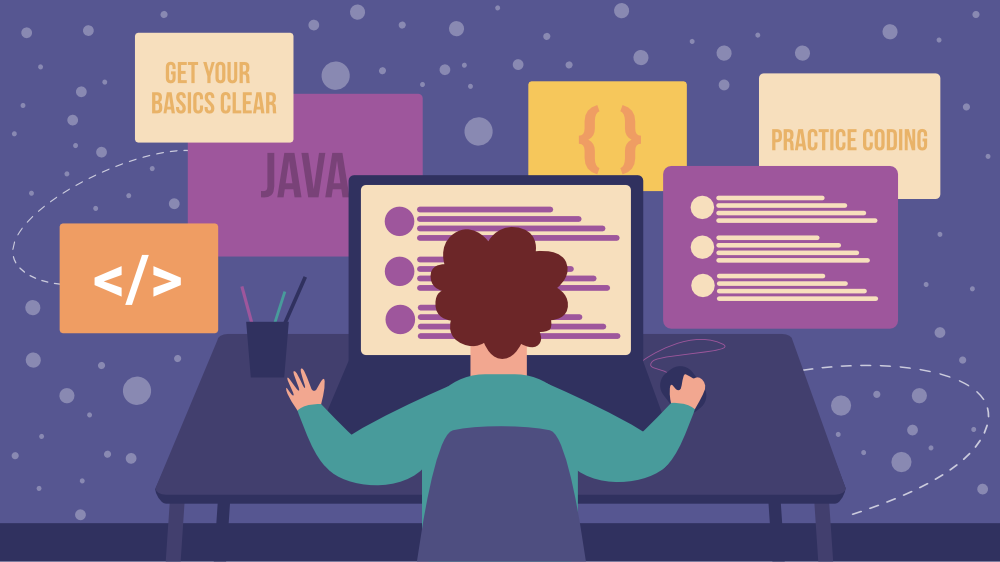Introduction
JAVA was developed by James Gosling at Sun Microsystems Inc in the year 1991, later learned by Oracle Establishment. Java is a very successful and famous programming language. It is very responsible and is generally used in our day-to-day lives, conspicuously seen in web or mobile applications. There is much demand used for Java nowadays and Java programmers are being recruited essentially in the Info Technology sector. Java is the core language for Android and many creative web applications. Originate your path toward becoming a professional developer by building a dense foundation in the Java language.
What is Java used for?

Java works great within corporate environments, or if you’re building a very large-scale system. Most often Java is used to build large enterprise-class applications. While it can be used for small tasks, it’s less suitable for that.
How to become a Java developer?
So you have an idea of the learning you need to get appointed as a Java developer, now it’s time to make it happen. Here’s how you can become a Java developer and some possessions to get you started.

Step. 1
Start learning Core Java (Java SE) by yourself. Every good Java developer and backend developer remains well-versed in Java SE, and while mastery would not happen overnight, you should start familiarizing yourself now with its features and terminology.
Java SE provides the foundation used for deploying and developing general-purpose Java applications on desktops and servers. As per a Java developer, you would understand key SE concepts like loops, arrays, operators, and Object-Oriented Program systems (OOPs). You would also come to be familiar with Java SE’s general-purpose APIs, like java.math, java.lang, java.io, etc. APIs allow computers to communicate with all others across a common interface, and Java APIs include correspondences and classes that help developers minimize the lines of a program.
One way to come to be familiar with Core Java is to explore Java’s free variation then take a look at free online tutorials that can walk you through java coding while you are at it. Once you have come to be familiar with Core Java, you can then explore Java EE, or Advanced Java, which has additional features you can use for online applications besides mobile applications, such as Servlets and Java Server Faces.
Step. 2
Join a backend development program. Learning Java programming self-sufficiently is not used for everyone. As you can probably say, there remain lots of terms and elements to keep track of, and it can get overwhelming. Online Courses Coding and coding bootcamps remain a great alternative that provided you with guided help to understand key concepts and the knowledge you must to become a Java developer.
Coding bootcamps remain less costly than the traditional 4-year college route many are free or offer adjourned, tuition options and they are usually much quicker. They can last anyplace from some days to a few months, dependent on how specialized they are, and they can be an easier point of entry into Java than what you might find on yourself.
One great option is the DevOpsSchool Java for Absolute Beginners video course, which teaches and students how to write code using Java and guides them through some of the key concepts we’ve mentioned, like loops and arrays. Students can enroll in a free version, or they can sign up for a paid version that allows more personal time with the instructor and certification that can be used to create a standout resume.
DevOpsSchool is one of many options that can be found online. To help you get started, read our list of free resources you can check out to start mastering Java.
Step. 3
Build your portfolio with your own Java projects, emphasize this, underline this, and then color it red: if you want to become a Java developer, you need to prepare using Java. It is one thing to learn about Java practicalities and concepts, but setting them to work is where you can actually start to flex your skills and turn what you have to learn into the practical experience that will help you find a career you love.
Once you have got a feel for Java and you are familiar with Java concepts, experimentation by desktop, building mobile, and web applications. Find certain real-world projects associated with every one topic you learn that you can play around with. A few example projects you might try building remain an airline booking system, data visualization software, or an online survey system. This Average piece provides a great list of ideas you can play around with.
The more time you spend practicing Java, the better and more refined your programming skills will become over time and the more experienced you’ll be. Joined with learning about key concepts, practicing on your own time is the very finest way to prepare yourself for a career in Java programming.
Responsibilities of Java developer:
Java developers are responsible for developing, designing, and managing Java-based applications and tools. Examples of these include Android apps, software tools, web applications, and scientific applications. Reflect a simple Wikipedia search, the always-popular game Minecraft, or even a Mars rover controller. Java developer is behind all of them.

Roles of Java developer:
Modifying, Writing, and deploying well-designed and testable code
Programming, conducting software analysis, testing, and debugging
Creating software updates and enhancements
Using logic to solve problems
Working closely with an IT team and/or stakeholders.
What education do I need to become a Java developer?
Java is such an in-demand language, competition for jobs in Java can be ferocious. Traditionally, employers have seen candidates who have BS degrees in computer engineering, computer science, or a related subject, but a college degree is not necessarily required and certifications from non-traditional training programs like DevOpsSchool are becoming more widely accepted. As long as you have important hands-on software development knowledge and you are willing to work hard, you can become a Java developer.
Many employers also look for Java developers who have specific knowledge with Java-based web services, SQL and ORM, relational databases, and Test-driven Development.
What is Java developer do?

A Java developer remains responsible for software using the programming language Java and developing applications. A Java developer is a specialized kind of programmer who may collaborate with web developers and software engineers to integrate Java into websites, software, and business applications.
Skills for Java developer:

Basic Java developer skills: Service-oriented architecture/web services (SOAP/REST) Web technologies like CSS, HTML, JavaScript, and JQuery. Markup languages like JSON and XML. Object-oriented programming (OOP) concepts and patterns. Abstract classes and interfaces.
Why do we need JAVA?
Java is very multipurpose as it is used for programming applications on the web, mobile, desktop, etc, using different platforms. Also, Java has many features such as platform-independent characteristics, multiple security features, network-centric designing, dynamic coding, etc, that make it quite versatile.
Does Java have a Future?
Java has and will continue to have a very good future. Software that solves specific purposes like CRMs, ERP cloud internal software, Orchestration frameworks, IDMs, etc, have been built using Java. Meanwhile, this has taken years to build them they will continue to use them now and in the future.
The Versions of Java:
There are 4 platforms of the Java programming language:
Java Platform, Standard Edition (Java SE)
Java Platform, Enterprise Edition (Java EE)
Java Platform, Micro Edition (Java ME)
JavaFX.
Pre-requisite:
- Professional IT Certification, preferred.
- 1-3 years of experience developing apps.
- Expert level in Java programming.
- Experience in database management.
- Experience in Computer architecture.
- Capability to communicate effectively with a software development team on tight deadlines.
Conclusion
Java offers the real probability that most programs can be written in a type-safe language. But, for Java to be broadly useful, it needs to have more expressive power than it does at present. This paper addresses one of the areas where more power is desirable.
Thank you!

